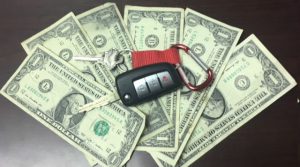
Regular vehicle maintenance can help you avoid expensive repairs. Photo credit: UF/IFAS Northwest District
A car is one of the biggest investments we will make. With proper car maintenance, you can increase safety, improve performance, and save money in the long run. According to AAA, big improvements in powertrain technology, lubricant, and rust prevention have led to improvements in automobile reliability, longevity, and durability. With proper care, almost any car can make it well past the 100,000-mile mark.
TIPS FOR PROLONGING THE LIFE OF YOUR CAR
• Do some research and purchase a safe, reliable vehicle
• Stick to the recommended car maintenance schedule
• Buy high quality parts: engine oil, battery, tires, etc.
• Keep your car clean, inside and out
• Know what to look for if your car is beginning to show signs of trouble
WARNING SIGNS THAT YOUR CAR MAY BE HEADED FOR TROUBLE
You know your car, and, therefore, you are the best judge of when it’s acting differently. There are signs your car may exhibit that will warn you of a potential problem. It could be a light, a sound, or an unusual smell. Consumer Reports recommends at the first sign of trouble, you should take your car to a reliable mechanic.
WARNING LIGHTS
Lights that appear on your dashboard are connected to sensors that monitor everything your car does. If your car senses that something isn’t quite right, the computer will use these lights to tell you what it is. If any of these lights appear, your mechanic will be able to hook up your vehicle to a diagnostic scan tool to identify the trouble and find out exactly what’s prompting the light to turn on.
Pay attention to these warning lights, as they could indicate a problem with your vehicle:
• Check Engine
• Check Oil/Oil Level Low
• Oil Pressure Low
UNUSUAL SOUNDS
You know your car and the sounds it normally makes, but new or different sounds can be a sign of trouble. These sounds can be a clue to what’s going on under the hood. GEICO Insurance offers a list of these sounds and their possible causes.
Sounds and Possible Causes
- A sound like a coin rattling inside a tin can: Could be a loose lug nut inside the hub cap.
- Brakes squealing or grinding: Your brake pads or shoes might need to be replaced. Pads may be worn, and the sound is metal on metal.
- A snapping, popping, or clicking sound when you turn a corner: One or both of the constant velocity (CV) joints on your front axle could need to be replaced.
- A rhythmic squeak that speeds up as you accelerate: This could indicate a problem with the universal joints (U-joints) in the driveshaft.
- A howling, whining, or even “singing” sound: Bearings, which are small metal balls that help parts rotate smoothly, may not be properly working.
- A rhythmic clunking, tapping, or banging from under the hood: This could indicate a problem with valves, pistons, or connecting rods. Rough, bumpy motions could be caused by faulty spark plugs, clogged fuel lines, or a bad fuel filter.
- A squealing sound from under the hood at start-up or when accelerating: This sound could be caused by worn or loose accessory belts for the power steering pump, air conditioner compressor, alternator, or the serpentine belt.
FOUL SMELLS
Toxic gases such as carbon monoxide are contained in a car’s exhaust system. If you smell a foul or strong smell while inside your car, this may be a sign of a serious problem. You should have it checked by a mechanic as soon as possible. If oil or coolant is leaking, this may mean hazardous exhaust gases are entering the interior of your car.
The smell of rubber burning could be a signal that your car’s drive belts or accessory belts underneath the hood are damaged, worn, or loose. These belts will need to be replaced as soon as possible to prevent more problems.
SMOKE
Smoke can come from the front or back of your car. Smoke coming from beneath the car’s hood most likely means your engine is overheating, and you should bring it to a mechanic right away. The color of the smoke coming out of your exhaust pipe can give you a clue about what may be going on inside your engine.
Blue Smoke: This could mean oil is escaping from somewhere within the engine and is being burned along with the gasoline. If you see blue smoke, your mechanic should look for damaged or worn seals in the engine.
White Smoke: May mean antifreeze or water condensation may have mixed in with the gasoline. You should have it checked out as soon as possible.
Mechanics agree that preventive maintenance, including regular oil changes and belt replacement, can help to extend the life of your car. Car maintenance can be an inconvenience that requires time, planning, and effort. But, in the long run, the benefits of driving a safe car outweigh the cost and aggravation.
For more information on how to save money by properly maintaining your car, contact your local UF/IFAS Extension Office.
Sources:
AAA: https://magazine.northeast.aaa.com/daily/life/cars-trucks/benefits-maintaining-vehicle/
Consumer Reports: https://www.consumerreports.org/car-repair-maintenance/make-your-car-last-200-000-miles/
GEICO: https://www.geico.com/more/driving/auto/auto-care/car-noises/?utm_source=geico&utm_medium=email&utm_content=newsletter&utm_campaign=feb2018
- Don’t Get Scammed - April 10, 2023
- September is Food Safety Education Month - September 28, 2022
- Meet Your FCS Agent: Laurie Osgood - August 2, 2022
